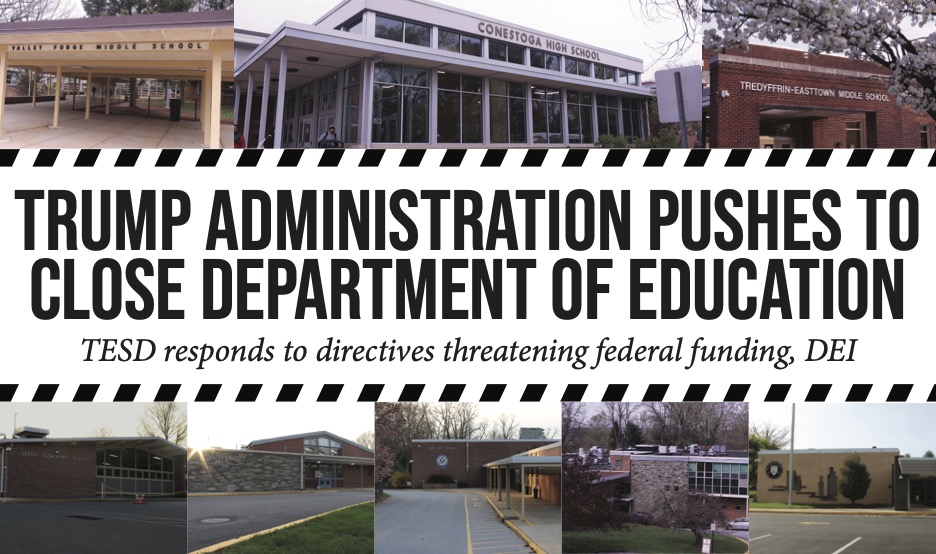On March 20, President Donald Trump signed Executive Order 14242, which outlined major changes to the Department of Education, the federal agency that grants aid to students nationwide and enforces educational policy. The order calls to close the department and “return authority over education to the States and local communities.”
Through programs and the Elementary and Secondary Education Act (ESEA), the department allocates funds and money from the federal government to schools and students. It is also responsible for collecting data on education for the public to access and managing student loans.
In its 2024-25 fiscal year General Fund Budget, the Tredyffrin/Easttown School District listed that it received around 0.5% of its funding from “Federal Sources” — $865,570 of its total budget of more than $181 million.
“We don’t get that much money from the federal government relative to our budget. That said, the money that we do receive is directed to some important programs within the district,” school board president Todd Kantorczyk said. “We currently believe that all the district programs are in compliance with all applicable state and federal laws, and so we do not believe that our funding is at risk.”
Of the district’s reported $865,570 in federal funding for the 2024-25 fiscal year, almost $150,000 came from Title I of ESEA for “Improving the Academic Achievement of the Disadvantaged” and $600,000 came from the School-Based Access Medicaid Reimbursement Program. The district receives the rest from Titles II, III and IV of ESEA and the Medical Assistance Reimbursement for Administrative Claiming Program.
The department also oversees special education programs such as those outlined in the Individuals with Disabilities Education Act (IDEA). The act covers a portion of expenses for the district to support students with disabilities. IDEA includes students who have Individualized Education Programs (IEPs), legally mandated documents outlining schedules and services to meet a student’s special education needs.
In the 2024-25 school year, the Department of Education issued $1,002,720 to the district from IDEA through the Chester County Intermediate Unit, marked as local revenue on the budget. According to director of special education Nicole Roy, the amount of funds TESD receives from IDEA is only one part of the district’s special education funding.
“This funding, though important, doesn’t fully cover the costs required to provide the necessary support for students with disabilities,” Roy wrote in an email. “For students who have IEPs, the funding from the Federal (Department of Education) plays a role in ensuring these students have access to the services they need, but the district still relies heavily on state and local resources to meet the full scope of these needs.”
Since taking office, Trump has threatened to rescind federal education funding over several issues. On Jan. 29, he signed Executive Order 14190, which aims to end “discriminatory equity ideology” in K-12 schooling. On April 3, the Trump administration sent out a memo to state and local education officials, including a certification for school officials to sign within 10 days to affirm the absence of “illegal DEI practices” or lose federal funding. The Pennsylvania Department of Education sent a letter to school officials in the Commonwealth on April 9 instructing them not to take action.
“We have programs that have some sort of equity component to them. We believe all these programs are in compliance with applicable state and federal law,” Kantorczyk said. “So, we don’t plan on changing any of these programs at the moment.”
Residents, administration comment on federal funding
The April 3 memo from the Department of Education threatened to remove all federal funding, including ESEA, IDEA and other federal programs, for schools that do not comply.
Jose Ibarra, a TESD resident and father of three Conestoga alumni, asked about the effects of potential federal funding cuts on district programs at the March 24 regular school board meeting. He had concerns about how the potential cuts and loss of federal funding for school programs could affect district taxpayers and students’ educational experiences.
“As a citizen of the community who appreciates the value of the education and the whole system — how it provides a great education K-12 — the fact that there’s a potential impact (with) the dismantling of the Department Education, I wanted to find out what the potential impact of a change of funding or lack of funding coming from the revenue stream could be on our school,” Ibarra said.
The district utilizes federal funds primarily for its special education, English language development, staff development and health programs. In the event of federal funding cuts, Director of Curriculum, Instruction, Staff Development and Planning Dr. Wendy Towle said that the district would still maintain these programs.
“By law, we have to provide an appropriate education for all of our students, particularly our special education students,” Towle said. “We have to have the specially designed instruction to meet their needs. Similarly, there are laws governing what we need to provide for our English language learners, so we would need to figure out how we can still meet those needs without that funding.”
District Superintendent Dr. Richard Gusick believes it is too early to make decisions related to changes in federal funding as the district does not have enough information to make an informed plan.
“Ultimately, if we lose funding, one of the things I hope would happen is that the state would pick up whatever difference happened,” Gusick said. “Our basic choice is we either have to figure out how to replace that funding, whether that’s through taxation or fees or something, or you’d have to reduce expenses in some way. That’s why we need to know exactly how much, when (a funding cut) would kick in and what programs it was targeting in order to make any of those decisions.”
Trump administration calls for end of DEI in schools
The Trump administration gave an initial deadline of April 14 for state and local officials to sign the April 3 memo’s certificate of compliance for the removal of DEI practices in public schools. The letter stated that the federal government would withdraw funding if schools fail to follow the administration’s interpretation of Title VI of the Civil Rights Act, stating that “certain DEI practices can violate federal law.” It has since extended the deadline to April 24 after facing pushback from states.
On April 9, Pennsylvania Executive Deputy Secretary of Education Angela Fitterer said in a letter to the U.S. Department of Education that “All of Pennsylvania’s (local education agencies) have previously certified, on multiple occasions, that they comply and will continue to comply with Title VI.” In a letter to school officials, the Acting Secretary of the Pennsylvania Department of Education Carrie Rowe instructed officials to take no action at this time, writing that “There are no federal or state laws generally prohibiting efforts relating to diversity, equity, or inclusion.”
Christopher Lilienthal is the assistant director of communications for the Pennsylvania State Education Association (PSEA), a labor union made up of retired, active and prospective teachers. Representing the PSEA, he agreed with the state department’s response.
“PSEA was very pleased to see that the Pennsylvania Department of Education reaffirmed that commitment that school districts are free to continue to celebrate diversity, promote equity and make public school classrooms safe and inclusive places for students to learn,” Lilienthal said.
Kantorczyk said that the district will follow the state’s direction regarding its response to the federal memo.
“The state, through (the Pennsylvania Department of Education), essentially responded and basically said that all of our local education agencies and other entities already have to certify for compliance with federal law in order to accept federal monies,” Kantorczyk said. “They issued that letter, which basically means that the district doesn’t have to do anything else at this point.”
Towle said that the administration does not plan to change its current equity programs. The district employs equity principles to create a “Safe, Supportive and Inclusive Learning Environment” through the TESD Equity Guiding Principles and the curricular inquiry process. The process encourages teachers to incorporate different voices into classroom lessons and materials with the goal of broadening perspectives.
“We do not believe that working towards creating a school community where all of our students feel as though they belong, where they can learn in ways that are appropriate for them, where our teachers are supporting students as individuals, constitutes discrimination,” Towle said. “In fact, we believe that by creating an environment where there are a multitude of perspectives that are valued and explored, what we’re doing is actually creating a supportive community and encouraging our students to be critical thinkers.”
Sophomore Samantha-Jane Lienert, a member of the district’s Diversity Committee and the Student Leaders Anti-Racist Movement club, has worked with Director of Equity and Public Programs Dr. Oscar Torres to discuss improvements to district equity standards and programs.
“I definitely heard and have talked about this a lot with not only administrators, but also my peers,” Lienert said. “The biggest thing that stood out to me is college and how education funding is being cut.”
Trump administration initiates changes to education funding
Since Trump signed Executive Order 14242, his administration has taken several actions to cut funding and programs from K-12 education. While it has not revoked federal funding specifically for Pennsylvania schools, the administration has cancelled public funding under the American Rescue Plan Act of 2021 and Coronavirus Response and Relief Supplemental Appropriations Act, including $185 million in federal funding owed to Pennsylvania school districts. The relief funding had expanded since the pandemic to support student mental health resources, classroom supplies, reliable high-speed internet and HVAC installations.

On April 10, Gov. Josh Shapiro joined 12 states in a lawsuit challenging the rescindment of the funding from the two acts.
“It’s up to the president of the United States to determine what the bureaucracy should look like in Washington, but they can’t break their commitment to the students in Pennsylvania — and I’m going to be watching real closely to make sure that they don’t,” Shapiro said after his March 21 public speech in Pittsburgh. “If anybody tries to take anything from Pennsylvanians, particularly our students, they’ll have to go through me.”
On April 7, the Trump administration moved to cut all $250 million of Maine’s K-12 funding for allegedly violating Title IX of ESEA after school officials refused to comply with Trump’s executive order to ban transgender athletes from participating in women’s sports. The U.S. Department of Agriculture, which funds school nutrition programs, also tried to pull funding for Maine until a federal judge ordered the federal government to unfreeze the funds.
“Maine may be one of the first states to undergo an investigation by his Administration, but we won’t be the last,” Maine Gov. Janet Mills wrote in a Feb. 21 state government press release. “But do not be misled: this is not just about who can compete on the athletic field, this is about whether a President can force compliance with his will, without regard for the rule of law that governs our nation. I believe he cannot.”
Aren Framil can be reached at [email protected].
Jeffrey Heng can be reached at [email protected].




















